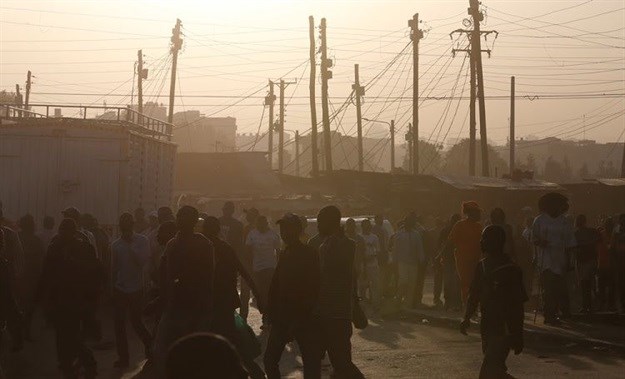Kenya's social media election: attack ads and data mining

The 90-second video, shot in moody monochrome, presented a dystopia in which Raila Odinga, the leading opposition candidate, wins the August vote and plunges the nation into a violent and inept dictatorship.
Under this scenario, tribes would be set against one another while terrorists run riot. "Stop Raila, Save Kenya. The Future of Kenya is in Your Hands," the video said.
East Africa's largest economy holds its general election on 8 August, a decade after disputed poll results fuelled violence that left more than 1,100 dead and hundreds of thousands displaced.
"The Real Raila"
It is unclear who is behind last week's slick video or "The Real Raila", the shadowy pro-government outfit that disseminated it.
But some on Kenya's vibrant social media networks were quick to blame Cambridge Analytica (CA), a company credited with using its data mining and psychological profiling techniques to help swing recent votes in the United States and Britain.
In May, local press reported President Uhuru Kenyatta's Jubilee campaign had hired CA. A spokesman, Nick Fievet, declined to comment on CA's possible work in Kenya but said it had "no connection" with the attack video.
With 7.1 million Facebook users and an estimated two-thirds of Kenya's 45 million people able to access the internet, there is a critical mass of people leaving an increasingly detailed trail of information about their fears and preferences -- a rich resource for those seeking to influence voting choices.
"Here it can lead to war," said John Githongo, a veteran anti-corruption campaigner. "The wrong video, the wrong information, it can go out of control."
New techniques
Githongo believes both government and opposition seek to use the new techniques, only the ruling party is more effective. "Jubilee has been way ahead from the very beginning."
CA worked on Kenyatta's last campaign in 2013 - devised by PR company BTP Advisers - to paint Kenyatta and his running mate William Ruto as victims of a Western imperialist plot to try them at the International Criminal Court for politically motivated tribal violence.
"We made the election a choice about whether Kenyans would decide their own future or have it dictated to them by others," said a statement by London-based BTP, which is reportedly working with Kenyatta and Ruto again this year.
According to its website, CA "designed and implemented the largest political research project ever conducted in East Africa" ahead of the 2013 vote to hone a campaign based on voters' desires for jobs and fears of "tribal violence".
It also "segmented the Kenyan population into key target audiences".
Now there are fears data will be swept up and used to create psychological profiles of voters so that specific messages can be tailored to specific voters.
Frederike Kaltheuner, a policy officer at data advocacy group Privacy International, is worried by the "lack of any kind of data protection framework" in Kenya.
"There are concerns about the integrity of data in Kenya. Who would have access to it? Who is storing it? Do people even know what is being collected about them? None of these questions are being answered," she said.
Concerns
Others are concerned about what happens when you seek to segment a society for electoral purposes where already politicians' primary appeals are to their ethnic constituents.
"There are very strong communities in Kenya and that's exactly the kind of situation present where you can start to drive different conversations about the election in different sub-communities," said Paul-Olivier Dehaye, a Swiss mathematician and data activist who has studied CA's techniques.
"We've seen it with Brexit and the US election, and the same can be done in Kenya, or elsewhere that there's a lot of fragmentation already."
"Fake news", a term that dominates political discourse in the United States, has already made itself felt in Kenya's election
Jeffrey Smith, executive director of the US-based Vanguard Africa, an organisation promoting free and fair elections, has been under attack since he invited Odinga to the United States in March to meet policymakers.
Fake letters
Soon afterwards fake letters - complete with Vanguard's company header and Smith's forged signature - began to circulate on Kenyan social media purporting to reveal efforts to rig Kenya's election for Odinga.
Smith then started suffering at the hands of trolls.
"At least once a week I'll wake up and have hundreds of Twitter notifications from accounts that are clearly bots and trolls tweeting in a coordinated manner, posting the same bogus and entirely false information over and over again," Smith said.
Data scientist Timothy Oriedo, founder of consulting company Vault Global, acknowledges the growing importance of the online battleground but says old-style tactics still play a key role.
"The old techniques of voter suppression, the normal things, will continue: ballot stuffing, gerrymandering," he added.
Source: I-Net Bridge

For more than two decades, I-Net Bridge has been one of South Africa’s preferred electronic providers of innovative solutions, data of the highest calibre, reliable platforms and excellent supporting systems. Our products include workstations, web applications and data feeds packaged with in-depth news and powerful analytical tools empowering clients to make meaningful decisions.
We pride ourselves on our wide variety of in-house skills, encompassing multiple platforms and applications. These skills enable us to not only function as a first class facility, but also design, implement and support all our client needs at a level that confirms I-Net Bridge a leader in its field.
Go to: http://www.inet.co.za




















